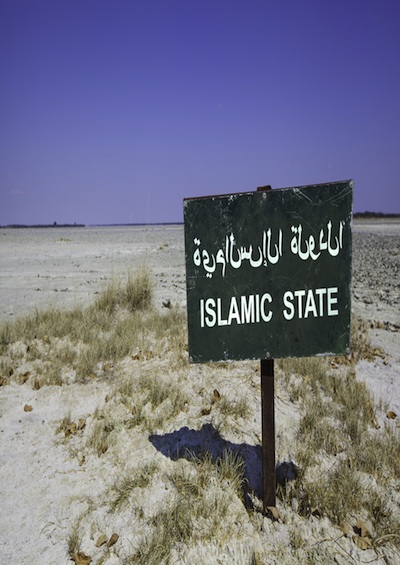ISIS as a Colonial Creature: Is Washington Being “Played”?
ISIS is not an aberration. It is a legitimate part of the Middle Eastern political landscape.
October 15, 2014

It is striking to see how in the United States the tactical discussion over how best to deal with ISIS has totally eclipsed the broader strategic debate over how best to deal with political transformation in the Middle East in general.
One U.S. politician after another, including President Obama, has proposed short-term expedients such as intensified air strikes or providing arms to one faction or another. But no one has even attempted to define a long-term strategy for dealing with the underlying causes of Mideast strife.
Even more troubling is that proposals coming from all across the U.S. political spectrum seem to harken back to old school solutions such as coalition building, as if ignorance can somehow legitimize ignorance. And when these coalitions turn out to be dominated by former colonial powers, one must ask serious questions.
Outdated policies for outdated structures
In essence, the United States — along with the major European powers — seems intent on enforcing political structures that were planned and implemented nearly 100 years ago.
These political solutions – the Sykes-Picot Agreement, the Treaty of Sevres and the Treaty of Lausanne of 1923 — were designed to dismantle the Ottoman Empire. They were effective in achieving that goal, but highly ineffective in establishing a stable political landscape through much of the Middle East.
The European post World War I agenda for the Middle East proved difficult to impose. To start with, the still-colonial European powers defined fictional jurisdictions that did nothing to address issues of ethnicity or sect.
In fact, many of these “countries” housed fiercely opposing factions — a factor that neutralized them as international threats.
Left largely unresolved in these agreements and treaties, for example, was what to do with the Kurds, which maintain militant minorities in Iraq, Iran, Syria and, significantly, Turkey. The post-Ottoman treaties made no provision for dealing with these minorities, which together populate a contiguous strip of oil-rich land that is referred to by the Kurds as, yes, Kurdistan.
Nor did the Europeans try to address issues on the Arabian Peninsula. Here, tribal rivalries were thought to have been beyond rational resolution.
Totally unmentioned was the Sunni-Shia schism.
Thousands of years of conflict and Baghdad Airport
Although the ethnic and sectarian divisions that define Middle East politics are now well-understood, the discussion in the West has come to focus on whether or not one Iraqi faction can fend off another Iraqi faction to maintain control of the Baghdad airport!
This point of view, whether it involves Sinjar Mountain, the city of Erbil, the Mosul Dam or the Kurdish enclave of Kobani, is myopic in the extreme, because it regards ISIS as an aberration.
ISIS is not an aberration. It is a legitimate part of the Middle Eastern political landscape.
Indeed, much of the debate over ISIS seems to focus entirely on its inclination toward terrorism. While there is validity in viewing ISIS as a terrorist threat, such a view ignores a crucial reality: In both Syria and Iraq, ISIS has taken the lead in a broad-based, Sunni-driven insurgency.
The temptation in the West to conflate terrorism and insurgency is great, especially because insurgent groups often employ terror tactics in their pursuit of political objectives. But insurgency incorporates an element that terrorism seldom does.
That element is popular support, where the local population either actively or tacitly supports the insurgency and the insurgent group leading it.
This is precisely the factor that makes dealing with ISIS so confounding. In both Iraq and Syria, ISIS enjoys broad-based support among much of the Sunni population.
Although there may be general antipathy to the radical Islamic tendencies of ISIS, there is also recognition that ISIS is leading the fight against repressive regimes in Baghdad and Damascus – that is, regimes that repress Sunni Muslims.
Are we being “played”?
Voices in the West have suggested many different ways of dealing with ISIS. Inevitably, they involve choosing sides.
In particular, the Kurds seem to have many friends in the West, especially in Washington, D.C. There, they have lobbied the U.S. Congress with a persistent intensity that would be denied to them were they an actual legal jurisdiction.
The Shia majority in Iraq also gets sensitive treatment, mainly because of their long-term repression at the hands of Saddam Hussein, who got a big career boost from the U.S.’s CIA.
The Shia minority in Syria, which forms the backbone of the Assad regime, however, gets no such sensitivity. In part because of its ongoing state of war with Israel, Assad’s Syria has few if any friends in Washington, even though the Baathist Assad regime promotes a secular and pluralistic political order.
A simple conclusion — for simple minds
These political realities lead to a simple set of conclusions for U.S. policy:
1. Support the Kurds.
2. Collaborate with the Iraqi Shia to make Iraq work as a state.
3. Oppose Assad, but without disturbing the secular and pluralistic political order.
This set of political expediencies, however, is so contradictory that it is impossible to implement effectively. Furthermore, it provides a logical basis for Sunni populations in both countries to support a radical insurgency.
It is important to realize that this radical insurgency gets support from those Sunni tribesmen of the Arabian Peninsula that Messrs. Sykes and Picot so judiciously overlooked.
In the meantime, the tactical approach of bombing and taking sides runs the risk of alienating the generally moderate Sunni populations in both countries. It also inflames regional tensions and redirects anger away from local problems toward Washington. The inevitable outcome of such an approach is the creation of another generation of anti-Western jihadists.
Barack Obama was right when he said that America doesn’t have a strategy for dealing with ISIS. Excoriated by the U.S. media for saying this, he has since proposed a grab-bag of tactical measures presented as strategy. That will do little to resolve the long-term political issues that grip the region.
Takeaways
ISIS is not an aberration. It is a legitimate part of the Middle Eastern political landscape.
The tactical discussion over ISIS has eclipsed the strategic debate over political transformation in the Middle East.
The West dismantled the Ottoman Empire -- but failed to establish a stable political landscape in the Middle East.
The inevitable outcome of current US policy is the creation of another generation of anti-Western jihadists.

